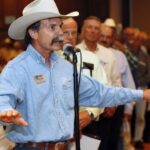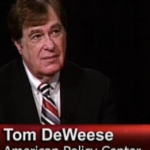Washington, D.C. — R-CALF USA is pleased that the U.S. Senate, through a unanimous consent vote, supported an amendment sponsored by Sen. Jon Tester, D-Mont., and Sen. Mike Enzi, R-Wyo.., that slashes funding for the U.S. Department of Agriculture’s (USDA’s) National Animal Identification System (NAIS) by one-half in the 2010 Agriculture Appropriations bill.
“…perhaps most important, USDA has pursued NAIS without working in cooperation with the very industry sector that would be directly impacted by the agency’s radical new proposal. Instead, USDA has proceeded to implement NAIS despite overwhelming opposition from the men and women who comprise our U.S. livestock industry, and particularly from those involved in the largest segment of our livestock industry — the U.S. cattle industry,” wrote R-CALF USA President/Region VI Director Max Thornsberry in a letter sent to Tester before the vote.
“As evidenced by USDA’s numerous listening sessions held throughout the U.S., this overwhelming opposition arises from those individuals who have the greatest stake in ensuring that our livestock herds remain protected from the introduction and spread of disease — the individuals whose very livelihoods and businesses are dependent on preventing, controlling and eradicating diseases,” the letter continued. “This, above all else, should demonstrate to Congress that USDA’s NAIS program is wholly inappropriate and unsuitable for the United States livestock industry.”
Thornsberry pointed out that USDA already has spent about $140 million of taxpayer money on NAIS, claiming the program would allow animal disease traceback within 48 hours, but such an arbitrary timeframe would not appear to prevent the spread of diseases with long incubation periods, such as bovine spongiform encephalopathy (BSE) or bovine tuberculosis. Nor would NAIS appear to prevent the spread of diseases that incubate very quickly, such as foot-and-mouth disease (FMD), which would necessitate more immediate containment actions to prevent disease spread beyond an infected animal.
Additionally, R-CALF USA signed on with a letter to the entire Senate from a coalition of 76 other organizations that oppose NAIS.
“Contrary to its stated purposes, NAIS will not address animal disease or food safety problems. Instead, NAIS imposes high costs and paperwork burdens on family farmers…In this letter, we will touch on just a few of the reasons that NAIS is fundamentally flawed:
1) No analysis or quantification of the alleged benefits. USDA has made unsupported assertions that our country needs 48-hour traceback of all animal movements for disease control. Yet USDA has failed to provide any scientific basis, including risk analysis or scientific review of existing programs, to support this claim. USDA has also asserted that NAIS would provide 48-hour traceback, but has failed to address the many technological and practical barriers. Existing disease control programs, combined with measures such as brand registries and normal private record-keeping, provide cost-effective traceback. A new and costly program such as NAIS is unnecessary and potentially counterproductive.
2) High costs. The costs of complying with NAIS will be unreasonably burdensome for small farmers and many other animal owners. The costs of NAIS go far beyond the tag itself, and include: premises registration database creation and updates; tags and related equipment, such as readers, computers, and software; 24-hour reporting requirements, replacement costs for lost tags, imposing extensive paperwork burdens; labor for every stage of the program; stress on the animals; qualitative costs, from loss of religious freedoms, privacy, and trust in government; and enforcement.
3) No food safety benefits. NAIS will not prevent food borne illnesses from e. coli or salmonella, because the contamination occurs at the slaughterhouse, while NAIS tracking ends at the time of slaughter. Thus, NAIS will neither prevent the contamination nor increase the government’s ability to track contaminated meat back to its source. In addition, NAIS will hurt efforts to develop safer, decentralized local food systems.
4) Unfair burdens placed on family farms and sustainable livestock operations. In addition to the costs, NAIS would impose significant reporting and paperwork burdens on small farms. In addition, sustainable livestock operations, which manage animals on pasture, would face higher rates of tag losses than confinement operations due to animals getting their tags caught on brush or fences. NAIS essentially creates incentives for CAFOs, with the accompanying social and environmental concerns.
“NAIS epitomizes what government should not do: it should not impose costly and highly intrusive regulatory burdens on private industry and private citizens without first considering alternatives, without first establishing a critical public need, and without first determining the effect that a significant government mandate would have on the culture and economy of the U.S. livestock industry,” said Thornsberry. “We view the Tester/Enzi amendment as an essential step towards requiring USDA to begin cooperating with U.S. livestock producers to prevent the introduction and spread of animal diseases and pests in livestock without violating the rights and privileges of the individual owners a! nd caretakers of those livestock.”
# # #
R-CALF USA (Ranchers-Cattlemen Action Legal Fund, United Stockgrowers of America) is a national, non-profit organization dedicated to ensuring the continued profitability and viability of the U.S. cattle industry. R-CALF USA represents thousands of U.S. cattle producers on trade and marketin! g issues. Members are located across 47 states and are primarily cow/calf operators, cattle backgrounders, and/or feedlot owners. R-CALF USA directors and committee chairs are extremely active unpaid volunteers. R-CALF USA has dozens of affiliate organizations and various main-street businesses are associate members. For more information, visit www.r-calfusa.com or, call 406-252-2516.



